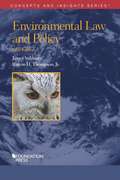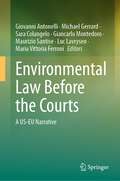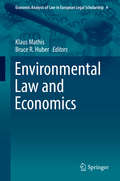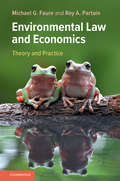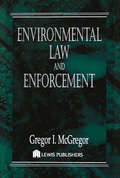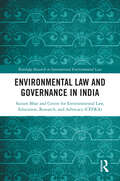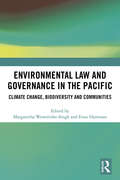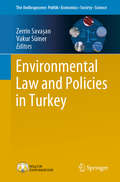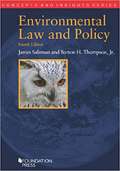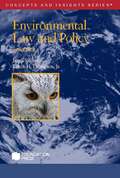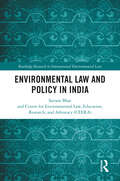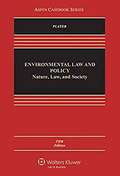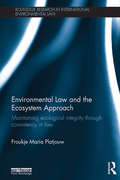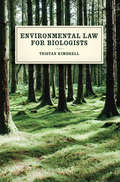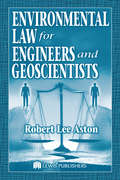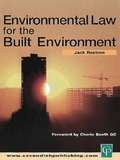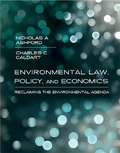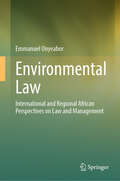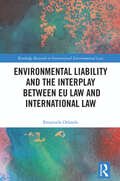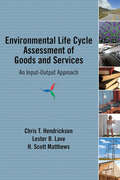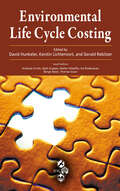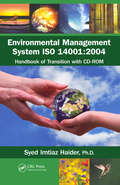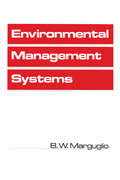- Table View
- List View
Environmental Law And Policy (Concepts And Insights)
by James Salzman Barton ThompsonEnvironmental Law and Policy is a user-friendly, concise, inexpensive treatment of environmental law. Written to be read pleasurably rather than used as a dry reference source, the authors provide a broad conceptual overview of environmental law while also explaining the major statutes and cases. The updated text also describes initiatives launched by the Trump administration. The first part of the book provides an engaging discussion of the major themes and issues that cross-cut environmental law. The second part of the book examines the substance of environmental law, with separate sections on each of the major statutes. The third part of the book describes natural resources law, discussing endangered species conservation, wetlands protection, water and energy issues. Part four addresses environmental impact statements and the National Environmental Policy Act. The book has wide adoption, not only in law schools, but also in graduate and undergraduate classes outside law school.
Environmental Law Before the Courts: A US-EU Narrative
by Luc Lavrysen Maria Vittoria Ferroni Giovanni Antonelli Michael Gerrard Sara Colangelo Giancarlo Montedoro Maurizio SantiseThis book sheds light on the latest trends in environmental law by analyzing some of the main sectors of law, including administrative law, constitutional law, EU law, US Law, and human rights law. It explores the evolution of these sectors before courts and tribunals from a US-EU perspective and from the perspectives of some of the foremost academics and justices from the major jurisdictions.Supranational and national courts, both in Europe and in the US, have delivered significant environmental judgements in recent years. The corresponding case law reflects how, in many jurisdictions, environmental and climate litigation continues to expand exponentially as a tool to strengthen environmental protection, whether by pushing national governments to be more ambitious or by enforcing existing statutes and regulations.Courts, particularly after the Paris Agreement, are increasingly seeking their own role as an important player in multilevel environmental governance. Courts in both the US and EU are at the forefront of this process and their role in shaping environmental rule of law will be fundamental in the near future.
Environmental Law and Contrasting Ideas of Nature
by Keith H. HirokawaLaw's ideas of nature appear in different doctrinal and institutional settings, historical periods, and political dialogues. Nature underlies every behavior, contract, or form of wealth, and in this broad sense influences every instance of market transaction or governmental intervention. Recognizing that law has embedded discrete constructions of nature helps in understanding how humans value their relationship with nature. This book offers a scholarly examination of the manner in which nature is constructed through law, both in the 'hard' sense of directly regulating human activities that impact nature, and in the 'soft' manner in which law's ideas of nature influence and are influenced by behaviors, values, and priorities. Traditional accounts of the intersection between law and nature generally focus on environmental laws that protect wilderness. This book will build on the constructivist observation that when considered as a culturally contingent concept, 'nature' is a self-perpetuating and self-reinforcing social creation.
Environmental Law and Economics
by Klaus Mathis Bruce R. HuberThis anthology discusses important issues surrounding environmental law and economics and provides an in-depth analysis of its use in legislation, regulation and legal adjudication from a neoclassical and behavioural law and economics perspective. Environmental issues raise a vast range of legal questions: to what extent is it justifiable to rely on markets and continued technological innovation, especially as it relates to present exploitation of scarce resources? Or is it necessary for the state to intervene? Regulatory instruments are available to create and maintain a more sustainable society: command and control regulations, restraints, Pigovian taxes, emission certificates, nudging policies, etc. If regulation in a certain legal field is necessary, which policies and methods will most effectively spur sustainable consumption and production in order to protect the environment while mitigating any potential negative impact on economic development? Since the related problems are often caused by scarcity of resources, economic analysis of law can offer remarkable insights for their resolution. Part I underlines the foundations of environmental law and economics. Part II analyses the effectiveness of economic instruments and regulations in environmental law. Part III is dedicated to the problems of climate change. Finally, Part IV focuses on tort and criminal law. The twenty-one chapters in this volume deliver insights into the multifaceted debate surrounding the use of economic instruments in environmental regulation in Europe.
Environmental Law and Economics: Theory and Practice
by Michael G. Faure Roy A. PartainIn Environmental Law and Economics, Michael G. Faure and Roy A. Partain provide a detailed overview of the law-and-economics methodology developed and employed by environmental lawyers and policymakers. The authors demonstrate how this approach can transcend political divisions in the context of international environmental law, environmental criminal law, and the property rights approach to environmental law. Private law solutions and public regulatory approaches are also explored, including traditional command-and-control and market-based forms of regulation. The book not only shows how the law-and-economics framework can be used to protect the environment, but also to examine deeper questions involving environmental federalism and the effectiveness of environmental law in developing economies. In clear, digestible prose that does not require readers to possess a background in microeconomics or mathematics, the authors introduce the theory and practice of environmental law and economics that have been so critical in the creation of robust environmental policy.
Environmental Law and Enforcement
by Gregor I. McGregorAmid all the laws and regulations on environmental protection and worker safety, what is the responsible business or landowner to do? What should the responsible consultant advise? Environmental Law and Enforcement provides you with a practical guide that takes the mystery out of environmental law and related land use controls.The author provides a synopsis of major environmental topics from A to Z and features citations to the major federal statutes in the United States Code (USC) and the Code of Federal Regulations (CFR) so you can easily find governing statutes and regulations. Special sections discuss the use of experts in case preparation and how to be an effective case witness. A checklist for compliance with the National Environmental Policy Act is included. The book covers strategies to cope with landowner liability for hazardous waste, consultant liability for mistakes in hazardous waste site assessments, and guidelines for emergency managers to minimize legal liability. The section on insurance liability provides practical approaches to dealing with insurance companies on hazardous waste claims. The successful organization will manage for environmental protection as a corporate goal, and consequently stays ahead of new government requirements-away from lawyers and lawsuits-and ahead of the competition. Environmental Law and Enforcement gives you the tools you need to achieve this mission.
Environmental Law and Governance in India (Routledge Research in International Environmental Law)
by Sairam BhatThis book provides an insightful and holistic up-to-date perspective of the constitutional governance and legal framework in India with regard to environmental protection.Covering the foundational principles of environmental law, the book details the current status of international environmental law in the face of complex environmental challenges including climate change. The topics covered include water resource governance, and coastal regulation, with a particular focus on the growing significance of the National Green Tribunal. It also covers the wide range of policies that have been introduced over the past 50 years and the impact these have had.The book will be of interest to researchers, legal practitioners, and scholars in the field of environmental law and governance as well as international law.
Environmental Law and Governance in the Pacific: Climate Change, Biodiversity and Communities
by Margaretha Wewerinke-Singh Evan HammanThis volume examines environmental law and governance in the Pacific, focusing on the emerging challenges this region faces. The Pacific is home to some of the world’s most astonishing biological and cultural diversity. At the same time, Pacific Island nations are economically and technically under-resourced in the face of tremendous environmental challenges. Destructive weather events, ocean acidification, mining, logging, overfishing, and pollution increasingly degrade ecosystems and affect fishing, farming, and other cultural practices of Pacific Islanders. Accordingly, there is an urgent need to understand and analyse the role of law and governance in responding to these pressures in the Pacific. Drawing on academic and practitioner expertise from the Pacific region, as well as Europe and the United States, this unique collection navigates the major environmental law and governance challenges of the present and future of the Pacific. Environmental Law and Governance in the Pacific discusses 21 Pacific Island countries and territories, including Cook Islands, Fiji, Papua New Guinea, Solomon Islands, Vanuatu, and Samoa, and a broad range of themes, such as deep-sea mining, wetlands and mangroves, heritage, endangered species, human rights, and access to justice, are addressed, thus providing a comprehensive and state-of-the-art overview of environmental law and governance within specific jurisdictions as well as across the Pacific region as a whole. This volume will be essential reading for students and scholars interested in environmental law and governance in the Pacific region, as well as policy-makers, practitioners and NGOs involved in the development and implementation of environmental law and policy.
Environmental Law and Policies in Turkey (The Anthropocene: Politik—Economics—Society—Science #31)
by Vakur Sümer Zerrin SavaşanThis book aims to provide a general systematic analysis of key issues of Turkish environmental law and policies and to highlight the related concerns and challenges. Its chapters provide a historical perspective and general understanding of the legal settings of Turkish Environmental Law; offer an overall understanding of the evolving and prevailing paradigms of legislation and administrative practices in environmental policy in Turkey; explain how EIA has become the main environmental management tool and instrument of environmental compliance in Turkey; discuss the project process, challenges and results of the EU-funded project ‘Turkey’s Map of Environmental Violations’ and food security in Turkey; and present a picture of environmental justice movements from bottom-up over the establishment and operation of small-scale hydroelectricity power plants.Thus, with its comprehensive coverage of up-to-date information and findings enabling the reader to understand the topic in full analyses of key themes in Turkish environmental law and policies, addressing, in separate chapters, concepts like environmental justice, food security, environmental compliance, environmental impact assessment (EIA), and environmental cases in Turkey in detail multidisciplinary approach enabling readers to learn about the topic in a holistic mannerit aims to be:• a valuable source of information about Turkish environmental law and policies• an effective tool to support teaching and research on Turkish environmental law and policies• an aid to decision-making on Turkish environmental issues• an important resource for graduate and postgraduate research students and policymakers working on Turkish environmental law and policies Given there is no competitive book on the market with similar coverage, it makes a meaningful contribution to Turkish environmental scholarship
Environmental Law and Policy (Concepts and Insights)
by James Salzman Barton H. ThompsonEnvironmental Law and Policy is a user-friendly, concise, inexpensive treatment of environmental law. Written to be read pleasurably rather than used as a dry reference source, the authors provide a broad conceptual overview of environmental law while also explaining the major statutes and cases. A series of problem exercises have been added throughout the book, describing a legal or policy conflict in detail and asking students to identify and assess solutions. The first part of the book provides an engaging discussion of the major themes and issues that cross-cut environmental law. The second part of the book examines the substance of environmental law, with separate sections on each of the major statutes. The third part of the book describes natural resources law, discussing endangered species conservation, wetlands protection, water and energy issues. Part four addresses environmental impact statements and the National Environmental Policy Act.
Environmental Law and Policy (Concepts and Insights)
by James Salzman Barton Thompson Jr.Environmental Law and Policy is a user-friendly, concise, affordable treatment of environmental law. Written to be highly readable and enjoyable rather than a dry reference source, the book provides a broad conceptual overview of environmental law while also explaining the major statutes and cases. The book includes multiple problem exercises, describing a legal or policy conflict in detail and asking students to identify and assess solutions. The new edition is fully updated to include policy initiatives of the Biden Administration, important recent Supreme Court decisions through the 2023-2024 term (Sackett, Loper Bright Enterprises, Jarkesy, Cedar Point Nursery), and the emerging role of Native American tribes in environmental law. The first part of the book provides an engaging discussion of the major themes and issues that cross-cut environmental law, including a new problem exercise on the Rights of Nature. The second part of the book examines the substance of environmental law, with separate sections on each of the major statutes. The third part of the book discusses important issues of natural resources law, including the public trust doctrine, endangered species conservation, wetlands protection, and energy issues. Part four addresses environmental impact statements and the National Environmental Policy Act. The book is one of the most widely adopted environmental texts not only in law schools but in both undergraduate and graduate classes.
Environmental Law and Policy in India (Routledge Research in International Environmental Law)
by Sairam BhatThis book focuses on administrative regulation in environmental law. It also focuses on climate change, and the push for sustainability.Covering the regulation on forest conservation, wildlife protection, water pollution, air pollution, and noise pollution, the book looks into the practical application of environmental legislation. This includes responses to international environmental agreements within India and the economic impact. It also discusses historical jurisprudence, and the administrative frameworks existing as a result of this.Focusing on contemporary issues within the legal landscape, the book aims to provide a solid foundation for researchers, legal practitioners, and scholars in the field of environmental law and policymaking.
Environmental Law and Policy: Nature, Law, and Society (Aspen Casebook)
by Lisa Heinzerling Zygmunt J. B. Plater Robert H. Abrams Robert L. Graham David A. Wirth Noah D. HallEnvironmental Law & Policy: Nature, Law & Society is a coursebook designed to access the law of environmental protection through a “taxonomic” approach, exploring the range of legal structures and legal methodologies of the field—rather than simply designing it according to air, water, toxics, etc. as subject media (which often results in duplicative legal coverage). All the major subject areas of pollution and resource conservation are covered, but they are covered according to the legal approaches they represent. <p><p> The book is “Saxist,” because it originally arose and continues to carry on themes from the teaching, guidance, and writings of the late Joseph Sax, the eminent pioneer of the environment law field who emphasized the interaction between common law and public law statutory structures, and introduced the public trust doctrine as a thread undergirding and running through the entire field of environmental law.
Environmental Law and the Ecosystem Approach: Maintaining ecological integrity through consistency in law (Routledge Research in International Environmental Law)
by Froukje Maria PlatjouwThe ecosystem approach embodies a concept of the environment which emphasizes the integrated components of nature as complex adaptive systems. This book examines the relationship between the architecture and design of environmental law and the implementation of the ecosystem approach as a means to maintain ecological integrity. The main issue addressed is: in which manner and to what extent does fragmentation and administrative discretion in environmental law impede the implementation of an ecosystem approach? This is explored through analysis of several questions: what is an ecosystem approach and how could it be implemented; how can economic evaluation of ecosystem services contribute to the debate; to what extent is environmental law fragmented and how does this affect the implementation of the ecosystem approach; to what extent does environmental law contain administrative discretion and how does this affect the implementation of the ecosystem approach; is there a need for greater consistency, coherence and a stronger rule of law in environmental law in light of the ecosystem approach? The main focus is on Europe, with additional international comparisons where appropriate. The book concludes by providing a normative portrayal of future environmental law as protective, systemic and predictable.
Environmental Law for Biologists
by Tristan KimbrellEnvironmental law has an unquestionable effect on the species, ecosystems, and landscapes that biologists study--and vice-versa, as the research of these biologists frequently informs policy. But because many scientists receive little or no legal training, we know relatively little about the precise ways that laws affect biological systems--and, consequently, about how best to improve these laws and better protect our natural resources. With Environmental Law for Biologists, ecologist and lawyer Tristan Kimbrell bridges this gap in legal knowledge. Complete with a concise introduction to environmental law and an appendix describing the most important federal and international statutes and treaties discussed, the book is divided into four broad parts: laws that focus on individual species, like invasive species policies, the Endangered Species Act, and international treaties such as CITES; laws that focus on land, from federal public lands to agricultural regulations and urban planning; laws that focus on water, such as the Clean Water Act; and laws that focus on air, such as the Clean Air Act and international measures meant to mitigate global climate change. Written for working biologists and students alike, this book will be a catalyst for both more effective policy and enhanced research, offering hope for the manifold frictions between science and the law.
Environmental Law for Engineers and Geoscientists
by Robert Lee AstonToday’s engineering and geoscience student needs to know more than how to design a new or remedial project or facility. Questions of law and ambiguities of terms often occur in contracts for mining, landfills, site reclamation, waste depositories, clean up sites, land leases, operating agreements, joint ventures, and other projects. Work place situations arise where environmental compliance methods are challenged by enforcement agencies. Although the statutes, rules, and regulations may seem to be worded clearly and specifically, there are often questions in application and sometimes varied interpretations. Environmental Law for Engineers and Geoscientists introduces simplified American jurisprudence focusing on the legal system, its courts, terms, phrases, administrative law, and regulation by the agencies that administer environmental law. The book comprehensively covers the “big five” environmental statutes: NEPA, CAA, CWA, CERCLA, and RCRA. With the basic law chapter as a foundation, the book covers the practical applications of environmental law for geo-engineers. It concludes with a chapter on the growing area of expert witnessing and admissible evidence in environmental litigation — an area of law where success or failure increasingly depends on the exacting preparation and presentation of expert scientific evidence. Written by a professional mining and geological engineer and a practicing attorney, Environmental Law for Engineers and Geoscientists prepares students for the numerous environmental regulatory encounters they can expect when dealing with various statutes, laws, regulations, and agency rules that govern, affect, and apply to environmental engineering projects. It provides a working knowledge of how to judge whether or not a project is in compliance with regulations, and how to ensure that it is.
Environmental Law for The Built Environment
by Jack RostronThis book provides a concise exposition of the relevant law and techniques commonly used to meet the regulatory requirements concerning the built environment. It provides a much needed reference and learning text for the growing professional and student involved in the subject. Aspects of environmental law and technology covered include the administration and sources of law,town and country planning, water and air pollution, waste, integrated pollution control and the natural environment. It highlights the importance of cross-boundary control, describing in detail the European and international law and enforcement regimes, the agencies involved in town and country planning, procedures at inquiries and enforcement measures, as well as looking at future developments. The important new protocol for assessing the environmental impact of developments is explained in detail. The policy framework and technical processes involved in dealing with water pollution are explored in terms of abstraction, supply, discharge and classification. Air pollution is dealt with in terms of energy efficiency, nuclear power, transport and future potential developments, and the recent phenomenon of sick building syndrome is explored in some detail. Other areas covered include the regulatory and technical processes involved in dealing with contaminated land, recycling/re-use, incineration, import/export and the law, policy and technology of integrated pollution control. A detailed exposition is offered of the legal issues concerning protection of the countryside, birds and animals; the problem of genetically modified crops; forestry; and mining.
Environmental Law, Policy, and Economics: Reclaiming the Environmental Agenda
by Charles C. Caldart Nicholas A. AshfordTraces important legal, economic, and scientific developments in the environmental field through an examination of environmental law cases and commentaries by leading scholars, focusing on pollution prevention and control and emphasizing the evaluation, design, and use of the law to stimulate technological change and industrial transformation.
Environmental Law: International and Regional African Perspectives on Law and Management
by Emmanuel OnyeaborThis book offers an overview of environmental law from both an international and regional perspective, focusing on global issues while at the same time offering uniquely African insights. The book addresses environmental issues, principles, and policies from the standpoints of law and management. There is a growing need for books on environmental law that integrate environmental issues, principles and policies in a single source to guide practitioners in the fields of environmental studies and environmental law. This book covers the corresponding principles, theories, procedural rights, international and regional strategies, liabilities and remedies for environmental damage, including in/to the marine environment. Topics addressed include atmospheric pollution, water pollution, marine pollution, land use, and waste management. Given its scope, the book will be of interest to practitioners in the fields of environmental studies and environmental law, corporations, policymakers, judges, students, and all others who are concerned with environmental issues, principles, policies and the law.
Environmental Liability and the Interplay between EU Law and International Law (Routledge Research in International Environmental Law)
by Emanuela OrlandoThe role of law in responding to global environmental problems and the interplay between different levels of regulation and governance is becoming increasingly relevant in the field of liability and reparation for environmental damage. This book examines the relationship and reciprocal influences between the EU and the international legal order in a multilevel and comparative perspective, in relation to the ongoing efforts to elaborate effective regimes of liability and reparation for environmental damage. It offers a comparative analysis of legal developments in the field of environmental liability within the EU and at the international law level and addresses questions concerning the impact of such interaction on the development, implementation and enforcement of appropriate responses to environmental damage within the respective legal orders and on a global level. Given the book’s focus and the transnational legal dimension of the issues covered, this volume will be of great interest to legal academics and researchers working in the environmental law field from an EU law and international law perspective, as well as more generally to scholars interested in the study of the relationship between EU and international law. Outside academia, the book will also be of great interest to practitioners wishing to get insights into the application of the law of environmental liability in the EU and at the international law level.
Environmental Life Cycle Assessment of Goods and Services: An Input-Output Approach
by Chris T. Hendrickson Lester B. Lave H. Scott MatthewsEnvironmental life cycle assessment is often thought of as cradle to grave and therefore as the most complete accounting of the environmental costs and benefits of a product or service. However, as anyone who has done an environmental life cycle assessment knows, existing tools have many problems: data is difficult to assemble and life cycle studies take months of effort. A truly comprehensive analysis is prohibitive, so analysts are often forced to simply ignore many facets of life cycle impacts. But the focus on one aspect of a product or service can result in misleading indications if that aspect is benign while other aspects pollute or are otherwise unsustainable. This book summarizes the EIO-LCA method, explains its use in relation to other life cycle assessment models, and provides sample applications and extensions of the model into novel areas. A final chapter explains the free, easy-to-use software tool available on a companion website. (www.eiolca.net) The software tool provides a wealth of data, summarizing the current U.S. economy in 500 sectors with information on energy and materials use, pollution and greenhouse gas discharges, and other attributes like associated occupational deaths and injuries. The joint project of twelve faculty members and over 20 students working together over the past ten years at the Green Design Institute of Carnegie Mellon University, the EIO-LCA has been applied to a wide range of products and services. It will prove useful for research, industry, and in economics, engineering, or interdisciplinary classes in green design.
Environmental Life Cycle Costing
by David Hunkeler Kerstin Lichtenvort Gerald RebitzerBalances Scientific and Economic Points of View to Thoroughly Address Management IssuesResponding to the need for clarification and benchmarks, Environmental Life Cycle Costing provides the fundamental basis on which to establish a definitive methodology. Clearly defining environmental LCC, this book balances scientific and econom
Environmental Litigation in China
by Rachel E. SternThis is a book about the improbable: seeking legal relief for pollution in contemporary China. In a country known for tight political control and ineffectual courts, Environmental Litigation in China unravels how everyday justice works: how judges make decisions, why lawyers take cases, and how international influence matters. It is a readable account of how the leadership's mixed signals and political ambivalence play out on the ground - propelling some, such as the village doctor who fought a chemical plant for more than a decade, even as others back away from risk. Yet this remarkable book shows that even in a country where expectations would be that law wouldn't much matter, environmental litigation provides a sliver of space for legal professionals to explore new roles and, in so doing, probe the boundary of what is politically possible.
Environmental Management System ISO 14001: Handbook of Transition with CD-ROM
by Syed HaiderEnvironmental Management System ISO 14001:2004 provides the information and practical know-how required to facilitate a smooth adoption and incorporation of the latest revisions and enhancements put forth by the International Organization for Standardization. This unique work shows how to adopt or transition to the documentation procedures required
Environmental Management Systems
by B. MarguglioThis book discusses the features of the environmental policies and procedures that should exist at the plant level and thus helps utility, petrochemical, chemical, pharmaceutical, and other manufacturing industries benefit technically and economically by implementing these feature.
